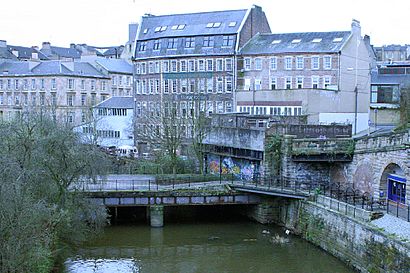Kelvinbridge railway station facts for kids
Quick facts for kids
Kelvinbridge
|
|
|---|---|

The remains of the station in 2007.
|
|
| Location | Kelvinbridge, Glasgow Scotland |
| Platforms | 2 |
| Other information | |
| Status | Disused |
| History | |
| Original company | Glasgow Central Railway |
| Pre-grouping | Caledonian Railway |
| Post-grouping | LMS |
| Key dates | |
| 10 August 1896 | Opened |
| 4 August 1952 | Station closed to passengers |
| 6 July 1964 | Station closed to freight |
| 5 October 1964 | Line closed |
| August 1968 | Station building destroyed by fire |
Kelvinbridge was a railway station located in the Kelvinbridge area of Glasgow, Scotland. It was an important stop for trains in the city's West End. This station was also very close to the Kelvinbridge subway station, which is part of the Glasgow Subway system.
Contents
A Look Back: When Kelvinbridge Station Was Active
Kelvinbridge station first opened its doors on 10 August 1896. It quickly became a busy place. It was especially important for visitors attending the 1901 Glasgow International Exhibition. This big event brought many people to Glasgow.
The station stopped serving passengers on 4 August 1952. Later, it closed for freight (carrying goods) on 6 July 1964. The entire railway line officially closed on 5 October 1964. Sadly, the station building was destroyed by a fire in August 1968.
Exploring the Station Area
The railway line came into the station area from the southeast. It went under Gibson Street, right next to the River Kelvin. The tracks followed the east side of the river. Then, at the northwest corner, the line crossed the river. It then went under Caledonian Crescent, which is where the main station building stood. There was also a 'goods yard' next to the tracks. This was a place where trains loaded and unloaded items. In 1965, this goods yard was turned into a car park for people to leave their cars and use public transport. It operated for more than a decade before the major subway reconstruction of 1977-1980.
The Station Building and Its Architect
A famous Glasgow architect named James Miller designed the Kelvinbridge station building. He designed many stations for the Caledonian Railway company. For example, he also designed the Botanic Gardens railway station, which was the next stop after Kelvinbridge. The Kelvinbridge station had a similar look to his other designs from that time.
After the station closed, the building was sadly destroyed by a fire in August 1968. Today, you can still see some of the outer walls and decorative stone. You might even spot parts of the black and white floor tiles that were once inside. Above where the station was, you can see Caledonian Mansions. The Caledonian Railway company built these mansions. They even put their special company symbol on the east side of the buildings, on Caledonian Crescent.
Tunnels and Tracks
From the northwest part of the station area, the railway line continued towards Botanic Gardens railway station. It went under Otago Street before entering a tunnel. This tunnel carried the trains under the busy Great Western Road.
The River Kelvin and Flood Protection
In December 1994, the River Kelvin flooded. The water flowed through the tunnel that led south from the station area towards Stobcross. To prevent future floods, a special bank was built. This bank stands in front of the tunnel entrance to protect the area.
| Preceding station | Following station | |||
|---|---|---|---|---|
| Stobcross Line closed; Station open |
Caledonian Railway Glasgow Central Railway |
Botanic Gardens Line and station closed |
||
Images for kids
 | Valerie Thomas |
 | Frederick McKinley Jones |
 | George Edward Alcorn Jr. |
 | Thomas Mensah |






